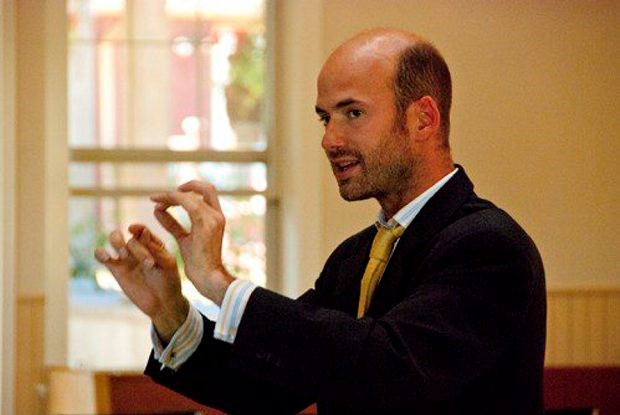PREVIEW
Victoria Symphony (Signature Series), with the Victoria Choral Society and vocal soloists, conducted by Tania Miller
When: Saturday, 8 p.m., and
Sunday, 2: 30 p.m.
Where: Royal Theatre (805 Broughton St.); pre-concert talk 45 minutes before each concert
Tickets: $33 to $80. Call 250-386-6121 or 250-385-6515; online at rmts.bc.ca; in person at the Royal and McPherson box offices or the Victoria Symphony box office (Suite 610, 620 View St.)
The Victoria Symphony's Signature Series this season has been built, with interesting results, around Beethoven's Ninth, exploring the impact this symphony had on composers of the 19th and 20th centuries as well as the "curse of the Ninth" that some superstitious musicians (beginning with Mahler) have read into the history of the symphony after Beethoven.
The opening concert of the series included Beethoven's First, reminding us of the comparatively modest, conventionally Classical start of his symphonic journey; the three programs that followed each included a work that spoke either to the shadow of the Ninth Symphony (Brahms's First, Shostakovich's Ninth) or to the "curse" (Mahler's Das Lied von der Erde, Berio's completion of Schubert's "Tenth").
This weekend, the Signature Series - and the whole 2011-12 season - will close, inevitably, with the thing itself, Beethoven's Ninth, conducted by the Victoria Symphony's music director, Tania Miller. In the finale, based on Schiller's poem To Joy, a hymn to universal brotherhood and reunion with God, the orchestra will be joined by four respected vocal soloists and the approximately 120 voices of the Victoria Choral Society.
One can scoff at the "curse," even dispute the Ninth's artistic merits - is that gaudy, giddy finale really uplifting or merely sententious? - but there is no denying that this was a radically innovative work that exercised an incalculable influence. Today, almost two centuries later, it is difficult to imagine a more intimidating assignment for a composer than to write something new whose express purpose is to serve as a companion piece to this musical monument.
That is precisely the assignment Rodney Sharman was given when Miller asked him to compose a curtain-raiser for this weekend's program.
Though Sharman found the task "unbelievably daunting," the happy result, formally commissioned by the Victoria Symphony with the support of the Canada Council, was his Second Symphony, which he has dedicated to Miller. (He composed his first symphony in 2000.)
Sharman is no stranger to Victoria or the Victoria Symphony. His family moved here from Saskatchewan when he was 15, and he earned his bachelor's degree in music at the University of Victoria in 1980. He subsequently studied in Germany and the United States, and has called Vancouver home for more than 20 years, but retains a connection to this city. From 2008 to 2010, he was the Victoria Symphony's composer-in-residence, a tenure that yielded four works including a violin concert performed (with Jonathan Crow) in March 2011.
Sharman describes the Second Symphony, which runs about 20 minutes, as being "in dialogue with Classical form," its two movements alluding to the four movements of a typical Classical symphony: The opening movement recalls the sonata-form first movements of most Classical symphonies while also serving as a "slow movement," and the second movement is "both a scherzo and a finale at the same time."
Moreover, the music directly addresses Beethoven's symphonic legacy, which Sharman has studied closely. While avoiding outright quotation, his Second Symphony employs musical procedures drawn from all of Beethoven's symphonies, including the Ninth, about whose artistic merits Sharman, for one, entertains no doubts: Its slow movement, he says, is "the one piece guaranteed to make me cry."
T his weekend's performances of Beethoven's Ninth will also mark the end of Giuseppe Pietraroia's tenure as music director of the Victoria Choral Society. Pietraroia, known familiarly as "Joey," assumed the post in 2005 and subsequently conducted the VCS in a diverse repertoire including major works by Handel, Mozart, and Dvorák, Orff's Carmina Burana (in collaboration with Ballet Victoria), and David Fanshawe's African Sanctus.
(Pietraroia is not going anywhere: He remains conductor-in-residence of both the Victoria Symphony and Pacific Opera Victoria, and will conduct Puccini's Tosca for POV next April.)
The VCS's new music director will be Brian Wismath, who has already taken charge of three ensembles since moving here in 2009: Vox Humana, the University of Victoria's Chamber Singers and the Victoria Conservatory of Music's chorale.
Wismath will prepare the VCS for its performances this fall with the Victoria Symphony, in Mozart's Requiem and Handel's Messiah, and will conduct the choir for the first time in public in the spring of 2013.
He promises "a fantastic program" for that debut; indeed, the adventurous repertoire he has demonstrated with his other ensembles should pay interesting dividends with the venerable VCS, now in its 77th season.
kevinbazzana@shaw.ca



